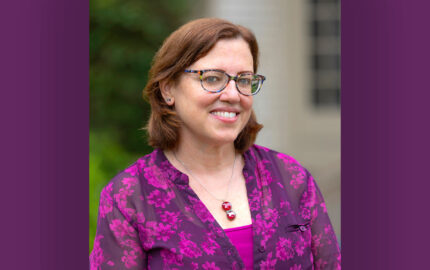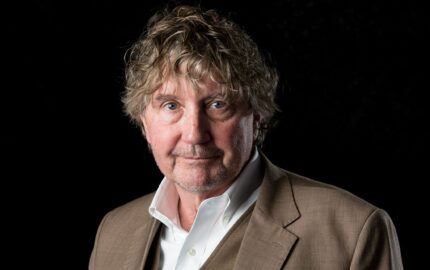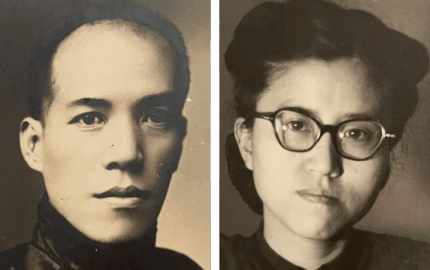CAMBRIDGE, Mass. (Aug. 12, 2002) — James C. Thomson, former Nieman Foundation curator, East-Asia historian and key figure in the Kennedy and Johnson administrations, died Sunday at Newton-Wellesley Hospital of cardiac arrest after a brief illness. He was 70.
As a member of the State Department under Presidents John F. Kennedy and Lyndon B. Johnson, Mr. Thomson was known for his early and unwavering opposition to the Vietnam War and his advocacy for U.S. reconciliation with Communist China at a time when such views were considered dangerously radical.
But it was his work with Nieman Fellows at Harvard from 1972 to 1984 that was "absolutely the highpoint of his working life," said his stepdaughter, Anne Butler of Brookline.
During his 12 years as curator of the Nieman Foundation, which awards year-long fellowships at Harvard for mid-career journalists, Mr. Thomson broadened the program to include more minorities, women and journalists from small news organizations and broadcasting. He conducted his role as curator as a partnership with his late wife, Diana, who pushed him to expand fellowship privileges to the spouses of fellows. In 1979, he enabled the Nieman Foundation to acquire as its headquarters the Walter Lippmann House, a stately 1836 Greek revival home at the edge of the Harvard campus.
Mr. Thomson held foreign policy roles in the State Department and on the National Security Council staff in the 1960's during the Kennedy and Johnson administrations.
In 1968, after leaving government, his article "How Could Vietnam Happen?" published in The Atlantic Monthly, was regarded as a searing insider's indictment of policy-making gone awry. The story earned for Mr. Thomson an Overseas Press Club award for the best magazine reporting on foreign affairs. His critique was widely published as an anthology in college textbooks.
Mr. Thomson's views on the need for U.S.-China rapprochement stemmed from his childhood in Nanking in the 1930's and 1940's, where his father, J. Claude Thomson, was a college science and chemistry teacher and administrator. In 1948, before his freshman year at Yale, Mr. Thomson spent a year in China, a time that coincided with the climax of the Chinese civil war and the Communist victory. The experience convinced him that America's security interests required engaging the new regime, not isolating it.
When President Richard Nixon went to China in 1972 to explore reconciliation, ABC Television asked Mr. Thomson, then a teacher in East Asian studies at Harvard, to serve as co-anchor with Howard K. Smith and Frank Reynolds. For his work as a commentator, Mr. Thomson shared an Emmy Award with his fellow anchors. He played major roles in subsequent TV documentaries on Vietnam and President Johnson, and a film on the life and times of his boyhood neighbor in China, Pearl S. Buck.
Mr. Thomson was valedictorian of his class at the Lawrenceville School and received his BA from Yale, where he was chairman of the Yale Daily News. He also received degrees from Cambridge University.
His itch for political involvement caused Mr. Thomson to interrupt his graduate studies of modern Chinese history at Harvard under the renowned John King Fairbank to assist Democrat Adlai Stevenson in his second run for the presidency in 1956. Known for his wry humor, Mr. Thomson would say that his greatest claim to immortality was his coinage, for a Stevenson speech, of the word "brinksmanship" to describe Secretary of State John Foster Dulles' boast of repeatedly bringing the world to the brink of war as a way of blocking Soviet adventurism.
Mr. Thomson returned to Harvard to finish his doctoral studies and then joined the staff of Rep. Chester Bowles, who had become Kennedy's foreign policy advisor for the 1960 presidential campaign and whom Mr. Thomson considered his greatest mentor. With Kennedy's victory, Mr. Thomson moved to the State Department, where he was assigned to the Far Eastern Bureau. In 1964, McGeorge Bundy, President Johnson's National Security Advisor, tapped him for the role of tracking, he said, the "waifs and strays of East Asia, nations neglected because of our total preoccupation with Vietnam."
In later years, Mr. Thomson would recall that Bundy tolerated and even encouraged his dissent on Vietnam and China. Upon leaving for the Ford Foundation in 1966, Bundy's parting words to him were, "Well, good-bye, good friend, Mao Ze-Thomson, my favorite dove."
Mr. Thomson taught at Harvard from 1967 to 1972, when he became curator of the Nieman Foundation. Mr. Thomson was given the assignment, he said, largely because of his prolific writings of op-ed and magazine pieces on public affairs and foreign policy. As he told a gathering of Nieman alumni a year later, "Think of me not as a journalist but as a journalizer: one who has hovered and nibbled at the fringes of journalism for most of my life. My academic friends think of me as a journalist; my journalist friends think of me as an academic."
At Harvard, Mr. Thomson took particular pains to serve as mentor and advisor to students and fellows, many of whom became life long friends. Derek Bok, president of Harvard at the time of his curatorship, said, " Jim Thomson was a warm and enthusiastic curator who made many cohorts of Nieman Fellows feel welcome at Harvard and helped them get the most from the university."
His wife, Diana, whom he had married in 1959, was a critic and poet who taught writing at Harvard. Mrs. Thomson died in 2001.
Following his resignation as curator in 1984, Mr. Thomson returned to teaching, becoming a professor of international relations, history and journalism at Boston University. He retired in 1997.
Mr. Thomson was the author of "While China Faced West: American Reformers in Nationalist China," published in 1969, and co-author of "Sentimental Imperialists: The American Experience in East Asia" in 1981.
He is survived by two stepchildren, Dr. Anne Butler of Brookline and Lawrence D. Butler of Ashland, Massachusetts; two sisters, Nancy Waller of Cherry Valley, NY, and Sydney Thomson Brown of Palo Alto, California, and four step grandchildren.
A service at Harvard Memorial Church for Mr. Thomson is being planned for September.
As a member of the State Department under Presidents John F. Kennedy and Lyndon B. Johnson, Mr. Thomson was known for his early and unwavering opposition to the Vietnam War and his advocacy for U.S. reconciliation with Communist China at a time when such views were considered dangerously radical.
But it was his work with Nieman Fellows at Harvard from 1972 to 1984 that was "absolutely the highpoint of his working life," said his stepdaughter, Anne Butler of Brookline.
During his 12 years as curator of the Nieman Foundation, which awards year-long fellowships at Harvard for mid-career journalists, Mr. Thomson broadened the program to include more minorities, women and journalists from small news organizations and broadcasting. He conducted his role as curator as a partnership with his late wife, Diana, who pushed him to expand fellowship privileges to the spouses of fellows. In 1979, he enabled the Nieman Foundation to acquire as its headquarters the Walter Lippmann House, a stately 1836 Greek revival home at the edge of the Harvard campus.
Mr. Thomson held foreign policy roles in the State Department and on the National Security Council staff in the 1960's during the Kennedy and Johnson administrations.
In 1968, after leaving government, his article "How Could Vietnam Happen?" published in The Atlantic Monthly, was regarded as a searing insider's indictment of policy-making gone awry. The story earned for Mr. Thomson an Overseas Press Club award for the best magazine reporting on foreign affairs. His critique was widely published as an anthology in college textbooks.
Mr. Thomson's views on the need for U.S.-China rapprochement stemmed from his childhood in Nanking in the 1930's and 1940's, where his father, J. Claude Thomson, was a college science and chemistry teacher and administrator. In 1948, before his freshman year at Yale, Mr. Thomson spent a year in China, a time that coincided with the climax of the Chinese civil war and the Communist victory. The experience convinced him that America's security interests required engaging the new regime, not isolating it.
When President Richard Nixon went to China in 1972 to explore reconciliation, ABC Television asked Mr. Thomson, then a teacher in East Asian studies at Harvard, to serve as co-anchor with Howard K. Smith and Frank Reynolds. For his work as a commentator, Mr. Thomson shared an Emmy Award with his fellow anchors. He played major roles in subsequent TV documentaries on Vietnam and President Johnson, and a film on the life and times of his boyhood neighbor in China, Pearl S. Buck.
Mr. Thomson was valedictorian of his class at the Lawrenceville School and received his BA from Yale, where he was chairman of the Yale Daily News. He also received degrees from Cambridge University.
His itch for political involvement caused Mr. Thomson to interrupt his graduate studies of modern Chinese history at Harvard under the renowned John King Fairbank to assist Democrat Adlai Stevenson in his second run for the presidency in 1956. Known for his wry humor, Mr. Thomson would say that his greatest claim to immortality was his coinage, for a Stevenson speech, of the word "brinksmanship" to describe Secretary of State John Foster Dulles' boast of repeatedly bringing the world to the brink of war as a way of blocking Soviet adventurism.
Mr. Thomson returned to Harvard to finish his doctoral studies and then joined the staff of Rep. Chester Bowles, who had become Kennedy's foreign policy advisor for the 1960 presidential campaign and whom Mr. Thomson considered his greatest mentor. With Kennedy's victory, Mr. Thomson moved to the State Department, where he was assigned to the Far Eastern Bureau. In 1964, McGeorge Bundy, President Johnson's National Security Advisor, tapped him for the role of tracking, he said, the "waifs and strays of East Asia, nations neglected because of our total preoccupation with Vietnam."
In later years, Mr. Thomson would recall that Bundy tolerated and even encouraged his dissent on Vietnam and China. Upon leaving for the Ford Foundation in 1966, Bundy's parting words to him were, "Well, good-bye, good friend, Mao Ze-Thomson, my favorite dove."
Mr. Thomson taught at Harvard from 1967 to 1972, when he became curator of the Nieman Foundation. Mr. Thomson was given the assignment, he said, largely because of his prolific writings of op-ed and magazine pieces on public affairs and foreign policy. As he told a gathering of Nieman alumni a year later, "Think of me not as a journalist but as a journalizer: one who has hovered and nibbled at the fringes of journalism for most of my life. My academic friends think of me as a journalist; my journalist friends think of me as an academic."
At Harvard, Mr. Thomson took particular pains to serve as mentor and advisor to students and fellows, many of whom became life long friends. Derek Bok, president of Harvard at the time of his curatorship, said, " Jim Thomson was a warm and enthusiastic curator who made many cohorts of Nieman Fellows feel welcome at Harvard and helped them get the most from the university."
His wife, Diana, whom he had married in 1959, was a critic and poet who taught writing at Harvard. Mrs. Thomson died in 2001.
Following his resignation as curator in 1984, Mr. Thomson returned to teaching, becoming a professor of international relations, history and journalism at Boston University. He retired in 1997.
Mr. Thomson was the author of "While China Faced West: American Reformers in Nationalist China," published in 1969, and co-author of "Sentimental Imperialists: The American Experience in East Asia" in 1981.
He is survived by two stepchildren, Dr. Anne Butler of Brookline and Lawrence D. Butler of Ashland, Massachusetts; two sisters, Nancy Waller of Cherry Valley, NY, and Sydney Thomson Brown of Palo Alto, California, and four step grandchildren.
A service at Harvard Memorial Church for Mr. Thomson is being planned for September.


